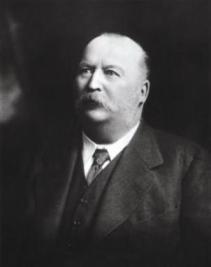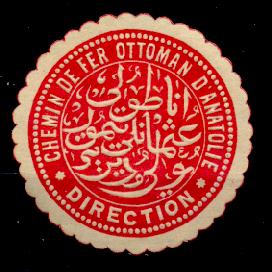Related Research Articles

William Knox D'Arcy was a British businessman who was one of the principal founders of the oil and petrochemical industry in Persia (Iran). The D’Arcy Concession was signed in 1901 and allowed D'Arcy to explore, obtain, and market oil, natural gas, asphalt, and ozokerite in Persia.

Calouste Sarkis Gulbenkian, nicknamed "Mr Five Per Cent", was a British-Armenian businessman and philanthropist. He played a major role in making the petroleum reserves of the Middle East available to Western development and is credited with being the first person to exploit Iraqi oil. Gulbenkian travelled extensively and lived in a number of cities including Istanbul, London, Paris and Lisbon.

Masjed Soleyman is a city and capital of Masjed Soleyman County, Khuzestan Province, Iran. At the 2006 census, its population was 206,121, in 51,530 families.
Major-General Sir Percy Zachariah Cox was a British Indian Army officer and Colonial Office administrator in the Middle East. He was one of the major figures in the creation of the current Middle East.

The Anglo-Persian Oil Company (APOC) was a British company founded in 1909 following the discovery of a large oil field in Masjed Soleiman, Persia (Iran). The British government purchased 51% of the company in 1914, gaining a controlling number of shares, effectively nationalizing the company. It was the first company to extract petroleum from Iran. In 1935 APOC was renamed the "Anglo-Iranian Oil Company" (AIOC) when Reza Shah Pahlavi formally asked foreign countries to refer to Persia by its endonym Iran.

The Iraq Petroleum Company (IPC), formerly known as the Turkish Petroleum Company (TPC), is an oil company that had a virtual monopoly on all oil exploration and production in Iraq between 1925 and 1961. It is jointly owned by some of the world's largest oil companies and headquartered in London, England, although today it is only a paper entity with historical rights and plays no part in the modern development of Middle Eastern oil.

The Baghdad railway, also known as the Berlin–Baghdad railway, was started in 1903 to connect Berlin with the then Ottoman city of Baghdad, from where the Germans wanted to establish a port on the Persian Gulf, with a 1,600-kilometre (1,000 mi) line through modern-day Turkey, Syria, and Iraq.

Sir Ernest Joseph Cassel, was a British merchant banker and capitalist. Born and raised in Prussia, he moved to England at the age of 17.
Bosporus Germans are those ethnic Germans living and settled in Istanbul since the second half of the 19th century.

Iran–United Kingdom relations are the bilateral relations between the United Kingdom and Iran. Iran, which was called Persia by the West before 1935, has had political relations with England since the late Ilkhanate period when King Edward I of England sent Geoffrey of Langley to the Ilkhanid court to seek an alliance.

The Ottoman Bank, known from 1863 to 1925 as the Imperial Ottoman Bank and correspondingly referred to by its French acronym BIO, was a bank that played a major role in the financial history of the Ottoman Empire. By the early 20th century, it was the dominant bank in the Ottoman Empire, and one of the largest in the world.
The San Remo Oil Agreement was an agreement between Britain and France signed at the San Remo conference on 24 April 1920. As a result of the agreement, the French Compagnie Française de Petroles (CFP) acquired a 25% share in the Turkish Petroleum Company (TPC). The other shareholders were the Anglo-Persian Oil Company (APOC) with 47.5%, the Anglo Saxon Petroleum Co 22.5% and the remaining 5% Calouste Gulbenkian.

Armenians in the Ottoman Empire mostly belonged to either the Armenian Apostolic Church or the Armenian Catholic Church. They were part of the Armenian millet until the Tanzimat reforms in the nineteenth century equalized all Ottoman citizens before the law. Armenians were a significant minority in the Empire. They played a crucial role in Ottoman industry and commerce, and Armenian communities existed in almost every major city of the empire. Despite their importance, Armenians were heavily persecuted by the Ottoman authorities especially from the latter half of the 19th century, culminating in the Armenian Genocide.

The Constantinople Agreement comprised a secret exchange of diplomatic correspondence between members of the Triple Entente from 4 March to 10 April 1915 during World War I. France and Great Britain promised to give Constantinople and the Dardanelles to the Russian Empire in the event of victory. Britain and France put forward their own claims, to an increased sphere of influence in Iran in the case of Britain and to the annexation of Syria and Cilicia for France, all sides also agreeing that the governance of the Holy Places and Arabia would be under independent Muslim rule. The Greek government was neutral, but in 1915 it negotiated with the Allies, offering soldiers and especially a geographical launching point for attacks on the Turkish Straits. Greece itself wanted control of Constantinople. Russia vetoed the Greek proposal, because its main war goal was to control the Straits, and take control of Constantinople.

Sir Henry Babington-Smith was a senior British civil servant, who served in a wide range of posts overseas, mostly financial, before becoming a director of the Bank of England. He was related to the Babington family through his maternal grandmother Mary, a daughter of Thomas Babington, and his children took the double surname Babington Smith.

Antoine Kitabgi Khan, born on October 2, 1843 in Constantinople and deceased on December 20, 1902 in Livorno (Italy), was a Persian general who was director general of customs in Persia from 1881 to 1893 and initiated important concessions during the reigns of Nasseredin shah and his successor Mozaffareddin shah. He was in particular the initiator of the oil concession granted in 1901 to William Knox D'Arcy which gave birth to British Petroleum.

The Chemins de Fer Ottomans d'Anatolie, founded on 4 October 1888, was a railway company that operated in the Ottoman Empire. The company was headquartered in Istanbul.

British Tanker Company Limited was the maritime transport arm of the Anglo-Persian Oil Company, the forerunner of BP. Formed in 1915 with an initial fleet of seven oil tankers, the British Tanker Company became the BP Tanker Company in 1955.

Sheikh Abdullah Bin Khaz'al was the son of Sheikh Khazʽal Ibn Jabir of the Emirate of Mohammerah, overlord of the Muhaisin tribal confederation and Emir of the oil rich emirate of Mohammerah, today part of the Iranian province of Khuzistan. He led the 1945 movement "The revolt of Sheikh Abdullah Bin Khaz'al" against the Iranian government, but failed.
References
- 1 2 3 4 Marian Kent (1975). Agent of Empire? The National Bank of Turkey and British Foreign Policy. The Historical Journal, 18, pp 367-389 doi:10.1017/ S0018246X00023736
- ↑ John Burman Politics and Profit:The National Bank of Turkey Revisited Oriens (Brill) Vol.37 (2009) pp = 225-236 jstor= 25759078
- 1 2 Jonathan Conlin (2016): Debt, diplomacy and dreadnoughts: the National Bank of Turkey, 1909–1919, Middle Eastern Studies, DOI: 10.1080/00263206.2015.1124418
- ↑ Marian Kent 1976 Oil & Empire:British Policy and Mesopotamian Oil 1900-1920 Macmillan Press ISBN 9781349020812
- ↑ Earle, Edward Meade (1924) The Turkish Petroleum Company:A Study in Oleaginous Diplomacy, Political Science Quarterly, vol 39, no.2,pp.265-279